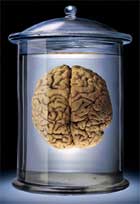Evidence from psychology is persuading economists that reason does not always have its way when it comes to deciding how much to produce or whether to save and invest. A burgeoning field called “neuroeconomics” seems poised to provide fresh insights on our economic behaviour.
Researches are made possible by new technologies such as magnetic-resonance imaging, which allows scientists to observe brain activity. Neuroeconomists hope that one day they will be able to measure how the brain performs in situations such as share selection, gambling or deciding to participate in a pension scheme.

Some claim that brain-scanning experiments are the start of a revolution in economics. No longer will economists rely on crude statistical models of how people behave in response to, say, an interest-rate rise or a tax increase. Instead, they will be able to peer directly into the brain to predict behaviour.
Much work remains. Identifying the parts of the brain that control economic actions is one thing. Harder tasks include determining how neural systems work together to create behaviour, and how wide is the variation in brain patterns between different people. Then there are age-old questions of free will: is your failure to save for old age simply a lifestyle choice, or is it down to faulty brain circuits?
Via Slashdot The Economist.
